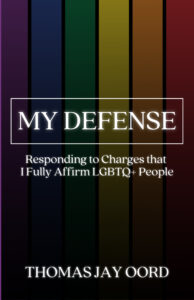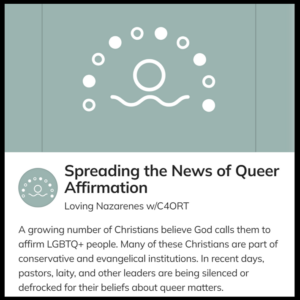Answering Questions After the Trial
The last few weeks have been a whirlwind. After being found guilty at my queer church trial, I have been talking with news sources, radio (BBC), podcasts, and more. And there are more developments in the works.
I’m writing this while in Britain. I’m living out of a backpack for a month as I travel to various cities to speak, including speaking at Greenbelt, a progressive Christian festival outside London. My last stop is Split, Croatia.
I’ve been asked many questions since the trial. So I thought I’d answer seven here…
Were you surprised by the verdict?
I was not surprised to lose my credentials. I was surprised to be excommunicated by having my membership removed. I was also surprised at how poorly the verdict was written and how bad the theology was as articulated by the writers. I brought leading theologians as my witnesses, but the discipline board, whose members have a small iota of theological training by comparison, thought they knew better! (To read the verdict, see this link.)
Would you change anything you did leading up to the trial or during it?
My strategy for this trial was not to be found innocent. I assumed I’d be declared guilty. That assumption freed me to be bolder than I might have otherwise been. I wanted to make the case for full queer inclusion, and my primary audience was the wider denomination and public. That’s why I hired media consultants, hired a videographer, talked to news outlets, published my defense before the trial, etc. I’m happy about that strategy. I’m also pleased with how I acted during the trial itself. (I’m grateful to my wife for her counsel and encouragement during it). Of course, I wish the discipline board had taken my expert witnesses more seriously.
How has this affected you personally?
Although I assumed this journey would be difficult emotionally, it was far more difficult than I expected. I dealt with anxiety, shortness of breath, weight gain, and more. I’m grateful for a supportive wife and family, and many friends reached out with encouragement. My pain, however, pales in comparison to what so many queer people endure at the hands of the church.
Can I read your defense?
The transcripts from the trial are not available yet. But my defense is available as a short book. The e-version is only 99 cents, and the print is $4.99.
Will you appeal the decision?
Earlier this year, my friend Dee Kelley went through a similar trial. He had written an essay for Why the Church of the Nazarene Should be Fully LGBTQ+ Affirming, the book my daughter and I co-edited. Dee lost his case and pursued several appeals. Not only were his queer inclusion “crimes” fewer than mine, I saw how unjustly he was treated by denominational leaders. When I don’t expect justice, I don’t see the point in appealing. But I’m happy Dee did.
Will you join another denomination?
Not anytime soon. While I’m grateful to the people who invited me to join their group, I plan to wait a long time before deciding if or which group to join. I went to trial 1) to encourage queer people, 2) to encourage allies, and 3) to move the Church of the Nazarene toward full queer inclusion. I wasn’t “burning bridges” on the way elsewhere. I plan to continue attending Real Life Church of the Nazarene in Nampa, Idaho, where I’ve been for several years. But I can’t be a member.
Can I help with your trial expenses?
Yes! While I did not hire a lawyer, I invested a lot of money in media consultants, videographers, book production, and social media help. You can contribute to a fund raiser to cover those costs. Click here: Spreading the News of Queer Affirmation.



Comments
I have followed such issues and I think, at the danger of being caught in semantics, that the word “affirming” is where separation happens. The gospel is the good news that Jesus came to make us new. He is the first born of a new creation and God’s ultimate purpose is to conform us to the image of His Son, Jesus. He alone is the source of spiritual life. Behavior that transgresses God’s intention for us in spirit, soul, and body. He calls us to overcome and the cross, Christ’s cross is our hope and the power of God to move us to overcome. Jay is married with a family. He has a love and mercy for those who live queer. I have struggled with sexual dysfunction, I know the love of Jesus and that His grace will never fail. I love myself but hate what I have done and want to be completely free. I do not see that as affirming. All people must come to Romans 12 and by the mercies of God yield to the Spirit’s beseeching that we present our bodies a living sacrifice unto righteousness. I have no degree in theology but I have a Savior who time and again says He does not condemn but says go and and sin no more. And I draw near to Him daily to draw on His strength to go on.
Thanks for your good note, Mark. I agree that “affirming” is not as clear as it could be. By it, I mean that I endorse and approve of queer identities, orientations, attractions and healthy sexual behaviors. And I think same-sex sexual behaviors CAN be healthy. Not all are. But not all opposite-sex sexual behavior is healthy. I hope that clarifies a bit.
Tom